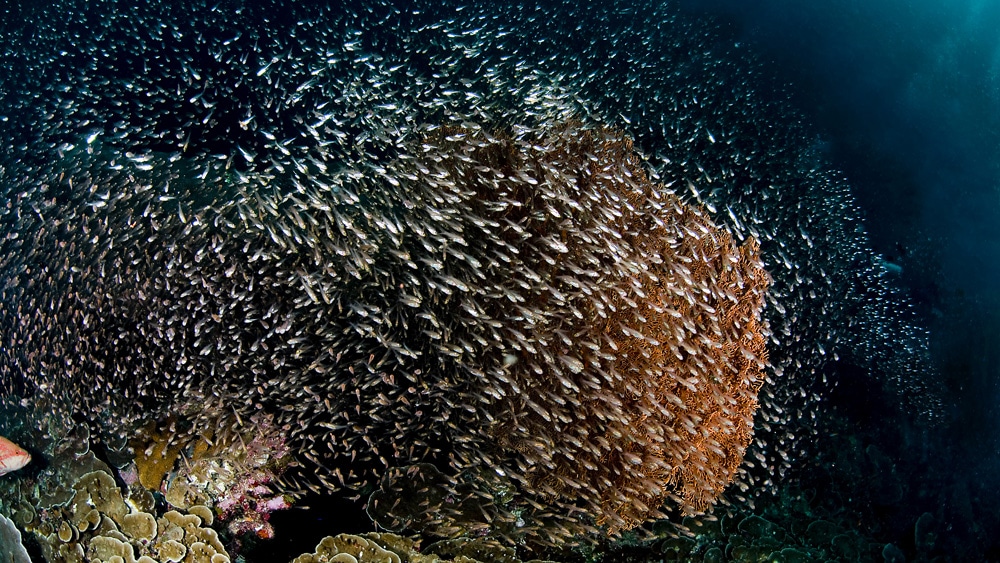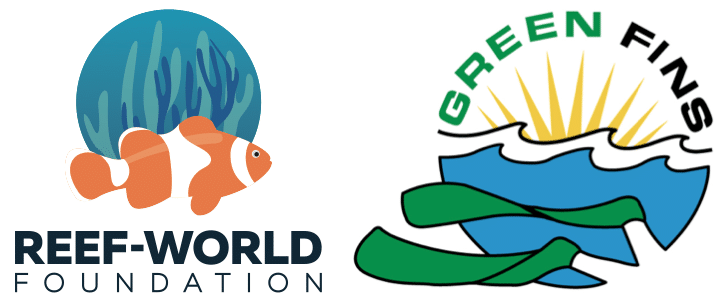Marine Life & Conservation
Reef-World’s conservation impact remains strong despite global pandemic

 Reef-World’s annual report reveals tangible conservation impact despite COVID-19 disruptions
Reef-World’s annual report reveals tangible conservation impact despite COVID-19 disruptions
New figures out in the last few days reveal that The Reef-World Foundation – international coordinator of the UN Environment Programme’s Green Fins initiative – certified more dive shops and reached more travellers with its conservation messaging than the previous year, despite disruptions to fieldwork caused by the COVID-19 pandemic.
Reef-World’s annual report, released today, revealed the charity reached 115,000+ travellers with its information on environmental best practice through its Green Fins initiative during its 2019–20 reporting period; up from the 110,000 travellers reached during 2018–19. With 115 dive centres assessed in 31 diving hotspots across 11 countries (compared to 98 operators in 10 countries the previous year), the number of active members increased 42% from 118 to 168.
As well as attracting new members, the programme continues to demonstrate its success in helping marine tourism operators reduce their direct, local impact on coral reefs; with data showing an average 20% reduction in environmental impact among members.
While implementation work was unable to take place during three months of the year, due to the global pandemic, the reduction in the number of dive staff trained in person was just 6.5% (1,870+ in 2019–20 compared to 2,000+ in 2018–19). However, digital innovations have enabled the charity to continue educating dive professionals around the world, no matter their location. Over 1,140 dive professionals signed up to the Green Fins Dive Guide e-Course: a unique online course which enables individual dive professionals to become Green Fins certified.
Key projects included: the launch of the Dive Guide e-Course Scholarship Fund to help scuba diving guides receive vital environmental certification; the nationwide rollout of Green Fins Egypt in partnership with the Chamber of Diving & Watersports (CDWS); a new initiative to help protect coral reefs in the Dominican Republic in partnership with the TUI Care Foundation; and creating new resources to support marine tourism operators around the world in their efforts to prioritise sustainability despite the COVID-19 pandemic. What’s more, the charity also signed a Memorandum of Understanding (MOU) with the UN Environment Programme (UNEP), which shall remain in effect until December 2025, to strengthen the framework of cooperation between the two organisations for their joint international coordination of the Green Fins initiative.
Anne Paranjoti, Founder of The Reef-World Foundation, said: “When UNEP asked me to create a framework for Green Fins back in the 1990s, I wanted to create something that would be open to all and provide a role for anyone that wanted to do something to protect the natural world around us. Today, the Green Fins tools and resources are still free for all wishing to join and provide a framework for anyone that would like to contribute and be part of a wider active community of conservators. The model underpinning Green Fins is one that allows us all to have a role – no matter how small – in protecting the natural environment and demonstrate actions that truly promote core values and reach beyond a limited view of sustainability. The outcome is, thus, enriched lives for all and sustainability of our beautiful natural resources.”
JJ Harvey, Director at The Reef-World Foundation, said: “Like many other charities and businesses across the travel industry, Reef-World has faced a tough time this year. Not only has the pandemic impacted our ability to conduct our environmental fieldwork but we also lost a valued mentor in the passing of our Trustee Andrea Leeman. Andy was as determined and strong-willed as the toughest out there and she would have been so proud of the conservation impact we’ve achieved despite COVID setbacks. As we move into a new normal, we’re determined to ensure sustainability remains a priority across the marine tourism industry. There are challenges ahead but we’re absolutely dedicated to protecting our precious marine ecosystems for the benefit of the local community, potential visitors, visitors and future generations.”
Chloe Harvey, Director at The Reef-World Foundation, added: “What a year it’s been – and we couldn’t have done it without you all! The generous donations and support from our partners and the general public have inspired us to continue the battle to protect our coral reefs around the world. We’d like to thank everyone for their efforts over the past year and are excited to work with you to forge a stronger path for sustainable tourism in the future. There’s much more to be done and the future is uncertain but, together, we can make sustainable diving the social norm.”
With 33 government and NGO staff trained to run the network at a national level, Green Fins now has 82 active assessors; one quarter (26%) of whom are female. The Green Fins national teams are looking forward to resuming training and assessments as soon as it is possible and safe to do so. In addition, plans for Green Fins’ expansion into Guam, Timor-Leste, Japan, Costa Rica and Colombia are in place for when travel opens up again.
Reef-World would also like to thank its partners whose vital support has resulted in significant tangible benefits for the ocean: PADI; 1% for the Planet; Explorer Ventures; the Blue O Two / Worldwide Dive and Sail alliance; Fourth Element; Caudalie; Professional SCUBA Schools International (PSS); ZuBlu; PATA; Paralenz; EXO Foundation; World Nomads and The Footprints Network; GSTC; MyDivePro; and Dive O’Clock.
The full 2019–20 Annual Report can be found here: https://reef-world.org/reefworld-annual-reports
Blogs
Invitation from The Ocean Cleanup for San Francisco port call

6 years ago, The Ocean Cleanup set sail for the Great Pacific Garbage Patch with one goal: to develop the technology to be able to relegate the patch to the history books. On 6 September 2024, The Ocean Cleanup fleet returns to San Francisco bringing with it System 03 to announce the next phase of the cleanup of the Great Pacific Garbage Patch and to offer you a chance to view our cleanup system up-close and personal.
We look forward to seeing you there.
To confirm your presence, please RSVP to press@theoceancleanup.com
PROGRAM
Join The Ocean Cleanup as our two iconic ships and the extraction System 03 return to San Francisco, 6 years and over 100 extractions after we set sail, to create and validate the technology needed to rid the oceans of plastic.
Our founder and CEO, Boyan Slat, will announce the next steps for the cleanup of the Great Pacific Garbage Patch. Giving you a chance to view our cleanup system and the plastic extracted.
Hear important news on what’s next in the mission of The Ocean Cleanup as it seeks to make its mission of ridding the world’s oceans of plastic an achievable and realistic goal.
Interviews and vessel tours are available on request.
PRACTICALITIES
Date: September 6, 2024
Press conference: 12 pm (noon)
Location: The Exploratorium (Google Maps)
Pier 15 (Embarcadero at Green Street), San Francisco, CA
Parking: Visit The Exploratorium’s website for details.
RSVP: press@theoceancleanup.com
Video & photo material from several viewing spots around the bay
We look forward to seeing you there!
ABOUT THE OCEAN CLEANUP
The Ocean Cleanup is an international non-profit that develops and scales technologies to rid the world’s oceans of plastic. They aim to achieve this goal through a dual strategy: intercepting in rivers to stop the flow and cleaning up what has already accumulated in the ocean. For the latter, The Ocean Cleanup develops and deploys large-scale systems to efficiently concentrate the plastic for periodic removal. This plastic is tracked and traced to certify claims of origin when recycling it into new products. To curb the tide via rivers, The Ocean Cleanup has developed Interceptor™ Solutions to halt and extract riverine plastic before it reaches the ocean. As of June 2024, the non-profit has collected over 12 million kilograms (26.4 million pounds) of plastic from aquatic ecosystems around the world. Founded in 2013 by Boyan Slat, The Ocean Cleanup now employs a broadly multi-disciplined team of approximately 140. The foundation is headquartered in Rotterdam, the Netherlands, and opened its first regional office in Kuala Lumpur, Malaysia, in 2023.
Find out more about The Ocean Cleanup at www.theoceancleanup.com.
Marine Life & Conservation
SHARK MONTH ARRIVES AT ROYAL WILLIAM YARD, PLYMOUTH

A shark has been spotted approaching Royal William Yard in Plymouth, much to the surprise of swimmers, paddleboarders and onlookers.
With its distinctive dorsal fin cutting through the water, the sizeable shark swam along the coastline, before turning to head inland towards Firestone Arch at Royal William Yard. The appearance drew a crowd, who were captivated for more than an hour by the unusual sight – and it was all caught on video.
The shark is one of many expected sightings at Royal William Yard over the coming weeks… because today marks the start of Shark Month!
In reality, the ‘shark’ spotted along the Plymouth shoreline was actually a custom-made model, created by the team at Royal William Yard and sailed underwater by Caroline Robertson‑Brown from the Shark Trust, who donned scuba diving gear for the occasion.
The stunt took place to launch Shark Month in style and draw attention to the work of the leading international conservation charity, which is based in Britain’s Ocean City. Spectators were reassured that the water was safe and many entered into the spirit of the performance, swimming or sailing alongside the shark.
Shark Month will take place across Royal William Yard throughout July and will feature an extravaganza of art, entertainment and advocacy for everyone to enjoy. The packed programme of events starts with an art exhibition and ends with a trip on paddleboards with shark experts – with everything from a shark quiz to a Jaws screening in between.
Paul Cox, CEO of the Shark Trust, said: “There are often assumptions and misconceptions when it comes to sharks. This was certainly the case with the shark spotted at Royal William Yard! While the British coastline is home to many species of shark, this was not one of them. However, we’re thrilled it caught people’s attention, because seeing a shark is a special and memorable moment. That is precisely why we want to celebrate these incredible creatures, highlight the need for conservation, and ask for help to safeguard their future.”
For more information about Shark Month at Royal William Yard, visit the Shark Trust Website.
Images and video: Jay Stone
-

 Blogs2 months ago
Blogs2 months agoDiving With… Nico, Ocean Earth Travels, Indonesia
-

 News1 month ago
News1 month agoMurex Bangka Announce New Oceanfront Cottages & Beachfront Dining
-

 Blogs2 months ago
Blogs2 months agoA new idea in freediving from RAID
-

 Marine Life & Conservation1 month ago
Marine Life & Conservation1 month agoIceland issue millionaire whale hunter a licence to murder 128 vulnerable fin whales
-

 Marine Life & Conservation2 months ago
Marine Life & Conservation2 months agoThe Shark Trust Great Shark Snapshot is back
-

 News3 months ago
News3 months agoCharting New Waters; NovoScuba Goes Global with the Launch of their Revolutionary Dive Training Agency!
-

 Gear News1 month ago
Gear News1 month agoNew Suunto Ocean – a dive computer and GPS sports watch in one for adventures below and above the surface
-

 Marine Life & Conservation Blogs2 months ago
Marine Life & Conservation Blogs2 months agoBook Review: Plankton















